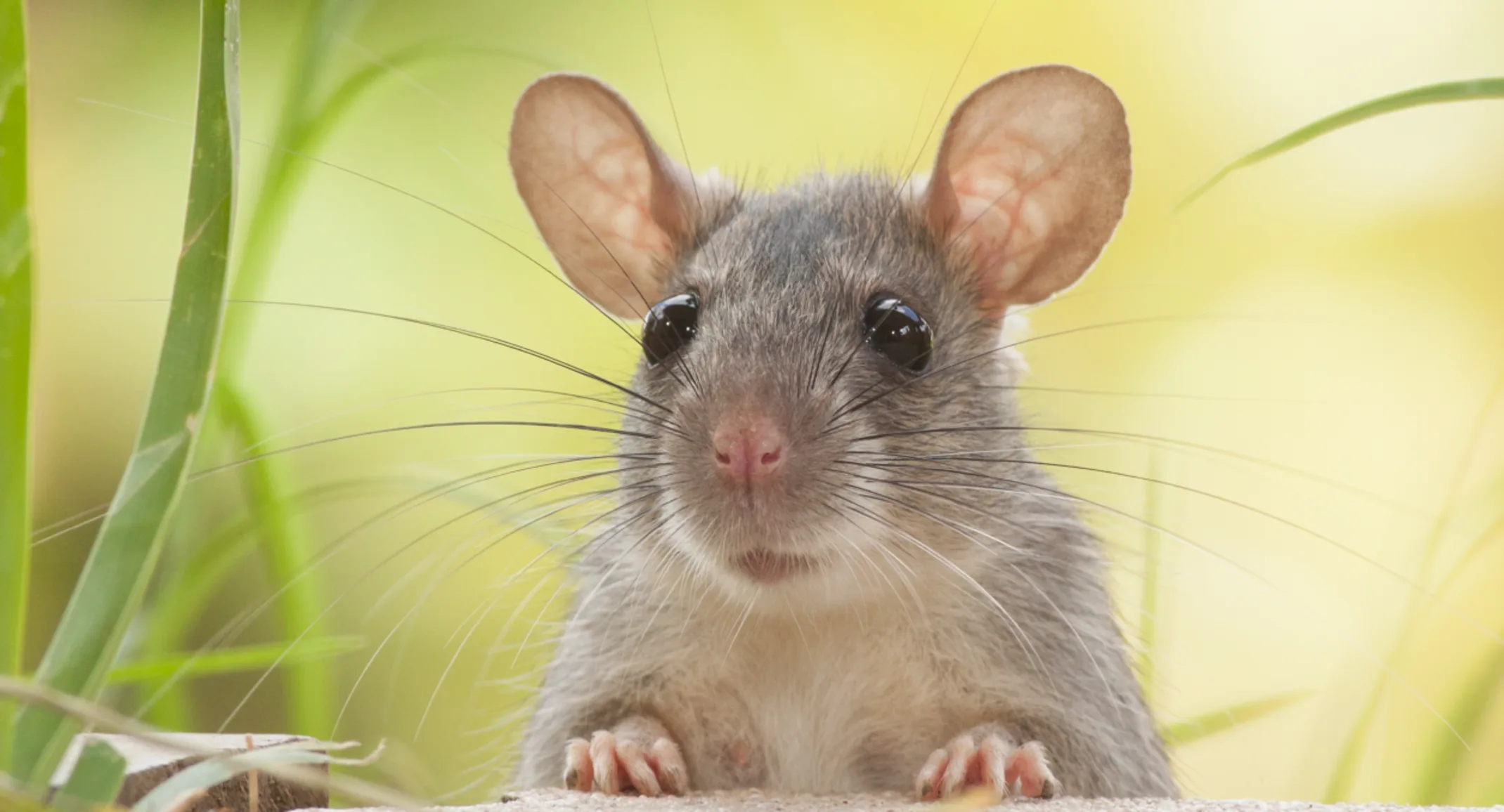Caring For Your Pet Rat
Exotic Animals

Basic Husbandry
General Information
Vital Statistics
Body Weight: 250-500g
Life Span: 2-3 years
Sexual Maturity
5-7 weeks of age
Behavior and Handling
Gently pick up your rat by placing your hand firmly over the back and rib cage.
Do not try to hold your rat by the tail, as this can cause serious injury.
Try to avoid excessive noise, needless excitement, and over handling.
Children handling rats should sit on the floor and hold the animal in their lap. Children should only handle rats under adult supervision.
Hair barbering (chewing of the fur) may occur in situations of stress and overcrowding. If this occurs, please contact your veterinarian.
Rats are tame and intelligent pets. They rarely bite unless provoked, and they can be trained to perform simple tricks.
Rats are usually nocturnal.
Rats are social animals. Both males and females can be housed in same sex groups. However, fighting is not uncommon. Monitor for wounds, over grooming, and weight loss as these may be signs of cage mate aggression. You may need to separate rats that show signs of aggression towards one another.
Reproductive Information
Male rats have a large scrotum, making them easy to differentiate from female rats
You may consider spaying or neutering your rats to prevent reproduction or prevent hormonally driven behaviors
Neutering helps curb aggressive behavior in males and can deter territorial problems like urine spraying.
Spaying may be helpful to female rats in preventing mammary tumors. While these tumors are often benign, they can reach a rather large size and often recur. Spaying may prevent a recurrence.
Housing
An escape-proof, wire mesh rodent enclosure with a plexi-glass, hard plastic or stainless steel metal solid flooring is preferred for housing.
The enclosure should be large enough to accommodate an exercise wheel of appropriate size, nest or burrow area, and feeding area. You can also supply hiding areas such as cardboard boxes; toilet or paper towel rolls and tissue boxes can also be provided for nesting.
Adult rats should be housed in a cage that is a minimum of 24”x24”x12”
Bedding should consist of a paper pulp product (like Care fresh or Yesterday’s News), newspaper, or computer paper. Wood shavings may be used but are poorly absorbent (avoid cedar, it’s toxic!).
Ideal room temperature is 65–80°F. Ideal humidity should be 40-70%.
Enclosure should be cleaned weekly to minimize respiratory disease risk.
Diet
Lab blocks or rodent blocks should be offered free choice. Recommended brands include Mazuri, ZuPreem and Oxbow Pet Products.
Treats may include vegetables, fruit, unsweetened cereal, and hay.
Seeds and treat sticks are not recommended as part of the diet because they are high in fat and low in protein and calcium.
Water should be offered in a sipper bottle or spill proof bowl and should be changed daily.
You may clean food and water dishes with mild soap and water or soak them in a dilute (1:30) bleach water solution.
Common Medical Conditions
Conditions Requiring Veterinary Attention
Malocclusion of Incisor teeth
This condition occurs when the front (incisor) teeth do not meet properly or are crooked and grow too long for the rat to eat.
Rat incisors grow continuously and require constant chewing to remain at a proper length. Injuries or age may also cause the teeth to grow abnormally.
Regular trimming of the incisor teeth may be necessary so that the rat does not lose weight. This often requires sedation.
Respiratory Infections
Symptoms include; sneezing, difficulty breathing, lethargy, and rough coat. The eyes or nose may produce typical crusted discharge or porphyrin, a dark red substance that looks like dried blood.
Frequent gasping or open-mouth breathing is a sign of respiratory distress and is a medical emergency.
Treatment may include oral antibiotics and in some cases nebulization.
Respiratory disease in rats can become a chronic condition, and the rat may need to be medicated for most of its life.
Tumors and Abscesses
Rats (males and females) are prone to mammary tumors at an early age. These will appear as large bumps under the skin that can grow rapidly. Surgical removal is the only treatment, and the tumors may return.
Abscesses are caused by small/deep cuts or bites (especially form other rodents). The skin over the wound heals, and under it, infected abscess material forms a lump. Treatment includes surgically opening and cleaning the abscess and starting the rat on an oral antibiotic.
Common Skin Diseases
Lice and mites are very common skin parasites in newly acquired rats. Mites can also become a problem in geriatric rats. Symptoms include itchy and/or red skin, hair loss over the body, and irritability. Treatments may include injections, topical treatments, or oral meds that kill parasites and are safe for your rat.
Ringworm is a highly contagious fungal infection of the skin that is transmissible to humans. Symptoms include raised, hairless, red patches that are often covered with a light-to-heavy crust. Treatment consists of the applications of topical antifungal medication and often oral antifungal medications.
Pododermatitis (“Bumblefoot”) is a pressure sore/swelling that can develop on the bottom of the feet in some rats. This typically is seen in sedentary animals or older animals living in bedding that is damp or not cleaned thoroughly. Treatment consists of antiseptic soaks, pain medication, antibiotics, occasionally bandaging, and cleaning the environment thoroughly.
Emergency / Critical Care
All emergencies require veterinary assistance. Use the following guidelines to assist you in caring for your rat until you can contact a veterinarian.
Traumatic Injuries
Broken Bones
Provide your rat with soft bedding such as a towel or blanket.
Minimize handling.
Keep your rat in a warm, dark, and quiet area.
Keep your rat as calm as possible and contact a veterinarian or local animal emergency clinic immediately.
Skin Injuries/Blood loss
For any type of injury with blood loss, use direct pressure with a towel or clean gauze to prevent further blood loss. Contact your veterinarian immediately if you are unable to stop the bleeding.
Severe Illnesses and Other Conditions
Head Injuries and Head-Tilt
Provide your rat with soft bedding such as a towel or blanket.
Minimize handling.
Keep your rat in a warm, dark, and quiet area.
Keep your rat as calm as possible and contact a veterinarian or local animal emergency clinic immediately.
Respiratory Distress
If your rat experiences open-mouth breathing or gasping for air, remove all bedding and minimize handling and stress.
Keep your rat as calm as possible and contact a veterinarian or a local animal emergency clinic immediately.
Health Recommendations
Things for your veterinarian to do:
Annual Physical
Always have an initial physical exam performed on any newly acquired rats. During the exam, the doctor will check the teeth, eyes, ears, heart, lungs, and abdomen. The doctor will also check the hair and skin for external parasites.
You should have your rat’s fecal sample checked for internal parasites.
Your rat should have an annual physical done by a veterinarian every year.
Things for you to do:
Overgrown Nails
Rats should have their nails checked/trimmed on a regular basis. If the nails get too long, they can become caught on the cage or toys and break off causing pain and bleeding.
If any of the nails break off and begin to bleed, apply styptic powder, flour, or cornstarch to encourage clotting, and apply direct pressure to the nail. If you cannot stop the bleeding, contact a veterinarian.
Over-the-Counter Medication
Over-the-counter topical triple antibiotic ointments or any other types of over-the-counter medications are not recommended without first consulting your veterinarian. Productions such as triple antibiotic ointment (for the use of minor skin injuries) can cause digestive problems if ingested and can potentially become toxic over time.
